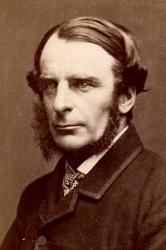
1819 - 1875 Person Name: Charles Kingsley (1819-1875) Topics: Science and Technology Author of "From thee all skill and science flow" in Ancient and Modern Kingsley, Charles, M.A., son of Charles Kingsley, of Battramsley, in the New Forest, was born June 12. 1819. at Home Vicarage, Devon. In 1838 he entered Magdalene Coll. Cambridge, and graduated as first class in classics, and senior optime. Subsequently Rector of Eversley 1814-1875; Canon of Chester 1869-1873; and Canon of Westminster 1873-1875. He held also other important appointments. He died at Eversley, Jan. 23, 1875. Canon Kingsley's prose works are too well known to be enumerated here, and his poetical productions have little in common with hymnology. Three of his pieces have come into use as hymns:—
1. Accept this building, gracious Lord. [Hospitals.] "Mrs. Kingsley's account of this hymn is:—
"On the 4th of December [1871], Lord Leigh laid the foundation stone of the working men's block of the Queen's Hospital at Birmingham with masonic honours, and the following simple hymn, which Mr. Kingsley had been requested to compose for the occasion, was sung by a choir of 1,000 voices:—
'Accept this building, gracious Lord,
No temple though it be;
We raise it for our suffering kin,
And so, good Lord, to Thee.'"
The hymn in full follows in 6 stanzas of 4 lines. (Charles Kingsley: His Letters and Memoirs of his Life. 1876, vol. ii., p. 370.) From this the hymn, well-known in American collections and in a few in Great Britain, “From Thee all skill and science flow," is taken. It is composed of stanzas iii.-vi.
2. My fairest child, I have no song to give you. [Purity and Courage.] Appeared in his Andromeda and Other Poems, 1858, p. 64, in 2 stanzas of 4 lines and entitled "Farewell." In the Life and Works of Kingsley, Poems, vol. 16, 1902, it is given in 3 stanzas of 4 lines, and inscribed to "C. E. G." and the appended date is "February 1, 1856." The addition of the extra stanza, as given in Mrs. Kingsley's Charles Kingsley: His Letters, &c,
1876, vol. ii., p. 236, is thus explained: "The Farewell' to his niece Mrs. Theodore Waldron, then Charlotte Grenfell, was written this year [1856], and as the second verse, by some mistake, was not published, it is given entire here." At the end of the poem the place and date are given as "Ray” Lodge, 1856." The lines so frequently included in hymnals for Girls' High Schools, "Be good, sweet maid, and let who will be clever," are from this poem.
3. Who will say the world is dying [The Coming Kingdom.] In his Andromeda and Other Poems, 1858, p. 123, in 3 stanzas of 8 lines and entitled "The World's Age." is dated 1849. In Horder's Worship Song, 1905.
--John Julian, Dictionary of Hymnology, New Supplement (1907)
Charles Kingsley

